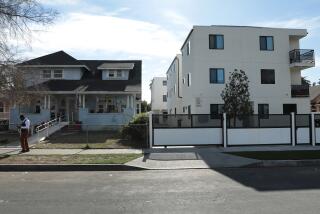Fannie Mae Decision Gives Seniors a Break
- Share via
WASHINGTON — In a move to avoid gouging older homeowners and their heirs, giant mortgage investor Fannie Mae has decided not to collect controversial “equity shares” attached to certain of its home loans.
The equity share feature allowed Fannie Mae to tap into the rapidly rising rates of appreciation on thousands of homes across the country. Under the program, seniors who took out “reverse mortgages” through Fannie Mae owed the company interest on the loans as well as a portion of the appreciated resale value of the properties. The 10% equity share provided Fannie Mae the right to collect thousands of dollars in extra loan fees-especially in high-cost, high-appreciation markets across the country.
The effective interest rate on some of the loans could exceed 30% to 40% a year, according to critics. The 34-million-member AARP, formerly the American Assn. of Retired Persons, lobbied Fannie Mae vigorously last year to stop promoting high-cost equity-share mortgages to seniors, and to consider refunding money to borrowers or their estates where they had paid excessive charges. The company terminated new purchases of the loans in August but announced no specific relief for homeowners who had paid large sums to the company, or for borrowers facing large payments.
Roy Green, a top housing official for AARP, said “we are delighted” by Fannie Mae’s decision to forgo its equity shares.
“They are leaving a fair amount of money on the table,” he said. Fannie Mae would not comment on its recent decision beyond providing a copy of a memorandum sent out to all participating lenders in the program. The company has estimated that it owns about 3,000 reverse mortgages with the equity-sharing feature.
In a reverse mortgage, seniors older than 62 pledge their home as collateral for cash advances from a lender-either in a lump sum, periodic payments or a credit line. Typically, the total loan amount plus interest and fees are not repaid until the senior dies, moves out or sells the home. The equity share feature offered borrowers higher initial cash payments in exchange for a share of the home’s value.
Critics have charged that the Fannie Mae program contained a provision that seniors often misunderstood: a big jump in loan costs immediately after the second anniversary of the closing. According to the nonprofit National Center for Home Equity Conversion, a 75-year-old woman with a $200,000 home who paid off early in the third year of a Fannie Mae “Home Keeper” equity-share loan could pay an effective interest rate over the loan term of nearly 35% yearly.
A 62-year-old woman with a $170,000 home in an area where values were rising 4% a year-half the 8.1% national appreciation rate for 2000-would owe Fannie Mae $62,526 at payoff early in the third year as repayment for just a $28,810 loan. That translates to a rate of 47.3% per year.
In its memorandum to participating lenders, Fannie Mae explained that “since the equity share feature was offered, the market has changed in many ways. Home price appreciation has been greater, interest rates have fluctuated, and in some cases, loans have prepaid earlier than expected.” The equity share option was first added in 1996.
As the loans paid off, Fannie Mae found itself reaping far larger returns-thanks to the hefty equity fees-than it had originally estimated. That, in turn, prompted the company to review the program’s fairness, and its appropriateness for a congressionally chartered private financial institution.
In its instructions to lenders, Fannie Mae asked them to forgo collection of “Home Keeper” equity shares as part of any loan payoffs. The company asked participating lenders to inform all existing borrowers of the change in policy immediately.
“I think they’re taking the high road,” said Green. A mortgage industry source said, “It’s clear to me that they [Fannie Mae] looked at the option of dealing with borrowers one by one,” but the potential for legal complications and bad publicity were too great.
But the key reason Fannie Mae took this costly step may well have been to support the concept of reverse mortgages-a financial tool still in its infancy that could play a major role in the years ahead, as baby boomers retire and tap their home equity to pay living costs. Negative publicity about the rip-off of seniors who took out reverse mortgages wouldn’t be helpful in convincing the next generation to consider the idea seriously.
*
Distributed by the Washington Post Writers Group.
More to Read
Inside the business of entertainment
The Wide Shot brings you news, analysis and insights on everything from streaming wars to production — and what it all means for the future.
You may occasionally receive promotional content from the Los Angeles Times.










